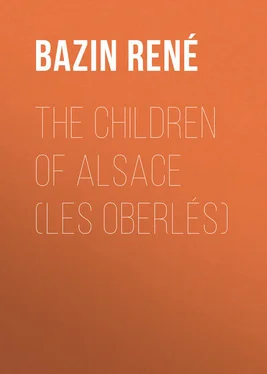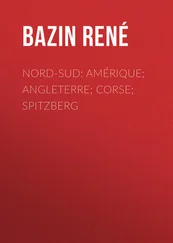René Bazin - The Children of Alsace (Les Oberlés)
Здесь есть возможность читать онлайн «René Bazin - The Children of Alsace (Les Oberlés)» — ознакомительный отрывок электронной книги совершенно бесплатно, а после прочтения отрывка купить полную версию. В некоторых случаях можно слушать аудио, скачать через торрент в формате fb2 и присутствует краткое содержание. ISBN: , Жанр: foreign_language, foreign_antique, foreign_prose, на английском языке. Описание произведения, (предисловие) а так же отзывы посетителей доступны на портале библиотеки ЛибКат.
- Название:The Children of Alsace (Les Oberlés)
- Автор:
- Жанр:
- Год:неизвестен
- ISBN:http://www.gutenberg.org/ebooks/34957
- Рейтинг книги:5 / 5. Голосов: 1
-
Избранное:Добавить в избранное
- Отзывы:
-
Ваша оценка:
- 100
- 1
- 2
- 3
- 4
- 5
The Children of Alsace (Les Oberlés): краткое содержание, описание и аннотация
Предлагаем к чтению аннотацию, описание, краткое содержание или предисловие (зависит от того, что написал сам автор книги «The Children of Alsace (Les Oberlés)»). Если вы не нашли необходимую информацию о книге — напишите в комментариях, мы постараемся отыскать её.
The Children of Alsace (Les Oberlés) — читать онлайн ознакомительный отрывок
Ниже представлен текст книги, разбитый по страницам. Система сохранения места последней прочитанной страницы, позволяет с удобством читать онлайн бесплатно книгу «The Children of Alsace (Les Oberlés)», без необходимости каждый раз заново искать на чём Вы остановились. Поставьте закладку, и сможете в любой момент перейти на страницу, на которой закончили чтение.
Интервал:
Закладка:
"Neither; I have just come from my room."
"It is better so. It is better for us to make our plans together, we two, without any one interfering. I have allowed you to return and to stay here precisely that we may arrange your future. Firstly, your military service in the month of October, with the fixed determination – am I right?" – and he dwelt on the following words – "to become an officer of the reserve?"
Jean, motionless, with head erect and straight look, and with the charming gravity of a young man who speaks of his future and who keeps a sort of quiet hold on himself which is not quite natural to him:
"Yes, father, that is my intention."
"The first point is then settled – and afterwards? You have seen the world. You know the people among whom you are called to live. You know that with regard to the German magistracy the chances of succeeding increased some time ago, because my own position has been considerably bettered in Alsace?"
"I know it."
"You know equally well that I have never wavered in my desire to see you follow the career which would have been mine if circumstances had not been stronger than my will."
As if this word had suddenly excited in him the strength to will, the eyes of M. Oberlé were fixed, imperious and masterful, on those of his son, like the claws of a bird of prey. He left off playing with his eyeglass, and said quickly:
"Your last letters indicated, however, a certain hesitation. Answer me. Will you become a magistrate?"
Jean became slightly pale, and answered:
"No!"
The father bent forward as if he were going to rise, and without taking his eyes off him whose moral energy he was weighing and judging at that moment:
"Administrator?"
"Neither. Nothing official."
"Then your law studies?"
"Useless."
"Because?"
"Because," said the young man, trying to steady his voice, "I have not the German spirit."
M. Oberlé had not expected this answer. It was a disavowal. He started, and instinctively looked into the workshop to make sure that no one had heard or even guessed at such words. He met the raised eyes of many workmen, who thought he was supervising the work, and who turned away at once.
M. Oberlé turned again to his son. A violent irritation had seized him. But he understood that it was best not to let it be seen. For fear that his hands should show his agitation, he had seized the two arms of the arm-chair in which he was seated, bent forward as before, but now considering this young man from head to foot, considering his attitude, his clothes, his manner, this young man who was voicing ideas which seemed like a judgment on the conduct of his father. After a moment of silence, his voice broken, he asked:
"Who has put you against me? Your mother?"
"No one," said Jean Oberlé quickly. "I have nothing against you. Why do you take it like that? I say simply that I have not the German spirit. It is the result of a long comparison, and nothing else."
M. Joseph Oberlé saw that he had shown his hand too much. He withdrew into himself, and putting on that expression of cold irony with which he was accustomed to disguise his true sentiments:
"Then, since you refuse to follow the career which I destined for you, have you chosen another?"
"Without doubt, with your consent."
"Which?"
"Yours. Do not be mistaken with regard to what I have just told you. I have lived without a quarrel for ten years in an exclusively German centre. I know what it has cost me. You ask me the result of my experience. Well, I do not believe that my character is supple enough, or easy-going enough if you like, to do more than that, or to become a German official. I am sure that I should not always understand, and that I should disobey sometimes. My decision is irrevocable. And, on the contrary, your work pleases me."
"You imagine that a manufacturer is independent?"
"No; but he is more independent than many are. I studied law so that I should not refuse to follow without reflection, without examination, the way you pointed out to me. But I have profited by the travels which you suggested, every year."
"You may say which I imposed upon you; that is the truth, and I am going to explain my reasons."
"I have profited by them to study the forest industry wherever I could – in Germany, in Austria, in the Caucasus. I have given more thought and consideration to those questions than you might suppose. And I wish to live in Alsheim. Will you allow me to?"
The father did not answer at first. He was trying on his son an experiment to which he deliberately submitted other men who came to treat with him about some important affair. He was silent at the moment when decisive words were to be expected from him. If the questioner, disturbed, turned away to escape the look which seemed to be oppressive, or if he renewed the explanation already made, M. Joseph Oberlé classed him among weak men, his inferiors. Jean bore his father's look, and did not open his mouth. M. Oberlé was secretly flattered. He understood that he found himself in the presence of a man completely formed, of a very resolute, and probably inflexible spirit. He knew others like him in the neighbourhood. He secretly appreciated their independence of temper, and feared it. With the quickness of combination and organisation habitual to him, he perceived very clearly the industry of Alsheim directed by Jean, and the father of Jean, Joseph Oberlé, sitting in the Reichstag, admitted among the financiers, the administrators, and the powerful men of Germany. He was one of those who know how to turn his mistakes to some advantage, just as he managed to get something from the factory waste. This new vision softened him. Far from being angry, he let the ironical expression relax which he had put on while speaking of his son's project. With a movement of his hand he pointed to the immense workshop, where, without ceasing, with a roar which slightly shook the double windows, the steel blades entered into the heart of the old trees of the Vosges, and said, in a tone of affectionate scolding:
"So be it, my son. It will give joy to my father, to your mother, and to Ulrich. I agree that you put me in the wrong on one point with regard to them, but in one point only. Some years ago I should not have allowed you to refuse the career which seemed to me the best for you, and which would have saved us all from difficulties which you could not take the measure of. At that moment you were not able to judge for yourself. And further, I found my work, my position, too precarious and too dangerous to pass it on to you. That has changed. My business has increased. Life has become possible for me and for you all, thanks to the efforts, and perhaps to the sacrifices, for which those about me are not sufficiently grateful. To-day I admit that the business has a future. You wish to succeed me? I open the door for you immediately! You will go through the practical part of your apprenticeship in the seven months which remain before you join your regiment. Yes, I consent, but on one condition."
"Which?"
"You will not mix yourself up with politics."
"I have no taste for politics."
"Ah, excuse me," continued M. Oberlé with animation; "we must understand one another, must we not? I do not think you have any political ambition for yourself; you are not old enough, and perhaps you are not of the right stuff. And that is not what I forbid – I forbid you to have anything to do with Alsatian chauvinism; to go about repeating, as others do, on every occasion – 'France, France'; to wear under your waistcoat a tricolour belt; to imitate the Alsatian students of Strasburg, who, to recognise and encourage one another, and for the fun of it, whistle in the ears of the police the six notes of the Marseillaise 'Form your battalions.' I won't have any of those little proceedings, of those little bravadoes, and of those great risks, my dear fellow! They are forbidden manifestations for us business men who work in a German country. They go against our efforts and interests, for it is not France who buys. France is very far away, my dear fellow; she is more than two hundred leagues from here, at least one would think so, considering the little noise, movement, or money which come to us from there. Do not forget that! You are by your own wish a German manufacturer; if you turn your back on the Germans you are lost. Think what you please about the history of your country, of its past, and of its present. I am ignorant of your opinions on that subject. I will not try to guess what they will be in a neighbourhood so behind the times as ours at Alsheim; but whatever you think, either try to hold your tongue, or make a career for yourself elsewhere."
Читать дальшеИнтервал:
Закладка:
Похожие книги на «The Children of Alsace (Les Oberlés)»
Представляем Вашему вниманию похожие книги на «The Children of Alsace (Les Oberlés)» списком для выбора. Мы отобрали схожую по названию и смыслу литературу в надежде предоставить читателям больше вариантов отыскать новые, интересные, ещё непрочитанные произведения.
Обсуждение, отзывы о книге «The Children of Alsace (Les Oberlés)» и просто собственные мнения читателей. Оставьте ваши комментарии, напишите, что Вы думаете о произведении, его смысле или главных героях. Укажите что конкретно понравилось, а что нет, и почему Вы так считаете.












